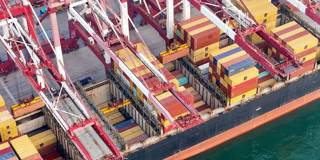The finance underpinning supply chains is crucial, but too many small businesses in emerging and developing economies cannot access it, cutting them off from the benefits of global trade. Plucking this relatively low-hanging fruit can drive progress toward many development goals at once.
GENEVA/WASHINGTON, DC – Supply chains form the backbone of international commerce, representing over half the value of global merchandise trade. They also create large numbers of jobs and lower the bar for countries and companies to participate in the world economy. But the finance underpinning supply chains is inadequate, leaving too many small businesses in emerging and developing economies cut off from the benefits of global trade.

GENEVA/WASHINGTON, DC – Supply chains form the backbone of international commerce, representing over half the value of global merchandise trade. They also create large numbers of jobs and lower the bar for countries and companies to participate in the world economy. But the finance underpinning supply chains is inadequate, leaving too many small businesses in emerging and developing economies cut off from the benefits of global trade.